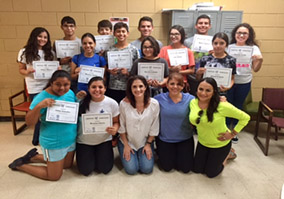 A key component of active Extension work is a committee identifying local issues and assisting with a plan of action to address them. The Maverick County Family & Consumer Sciences (FCS) committee identified obesity and diet-related diseases as a chronic issue in the county.
A key component of active Extension work is a committee identifying local issues and assisting with a plan of action to address them. The Maverick County Family & Consumer Sciences (FCS) committee identified obesity and diet-related diseases as a chronic issue in the county.
Current statistical data revealed 65.9% of adults in Texas are considered overweight and have a Body Mass Index (BMI) of 25 or higher. A BMI of 31% is considered obese because it is more than 30. Adolescents in Texas, grades 9 through 12, showed 15.6% are overweight and 13.6% are obese. Similarly, the overweight and obesity rate among Texas children, ages 2-5, reported 16.8% are overweight and 15.3% are obese.
Coronary heart disease, hypertension, stroke, type 2 diabetes and certain cancers are common chronic diseases associated with overweight and obesity. In the United States and indeed in Texas, these chronic diseases have a devastating impact on households below the poverty line. The annual cost associated with excess weight gain in Texas is approximately $15.6 billion in 2010 with an expected increase of $39 billion by the year 2040. According to the Bureau of Labor Statistics for Maverick County, it reports 30.5% of households are living below the poverty line.
The Family and Consumer Agent in Maverick County developed nutritional programs to address this immediate need. These programs in various locations throughout Maverick County to reach the diverse populations with custom curriculums of specific topics. The curriculums were:
- Live it! Real Live Nutrition for Teens – a nine-lesson program provides technical and educational information to limited resources individuals and families to raise nutritional and dietary knowledge. The program amplifies awareness and the relationship between high-calorie food consumption and lack of exercise to health issues.
- Choose Health: Food, Fun, and Fitness (CHFFF) – a comprehensive nutrition and fitness curriculum composed of six hands-on lessons for 8-12-year-olds (grades 3 to 6). Developed by Cornell University’s Division of Nutritional Sciences in collaboration with Cornell Cooperative Extension’s 4-H Youth Development Program, CHFFF uses experiential learning to teach healthy eating and active play. Research showed targeting eating and physical behavioral changes are the best measures for preventing childhood obesity and chronic disease. Topics include replacing sweetened drinks with low-fat milk and water, eating more vegetables, fruits, and whole grains, eating fewer high-fat and high-sugar foods, and being active 60 minutes a day.
Programming efforts throughout the year included:
- CC Winn High School, Eagle Pass High School, Frank Chisum Center and Parent Education Program for pregnant teens, conducted nutrition programs during health classes.

- Marketing efforts included radio interviews, newspaper ads, flyers, social media, emails, and outreach to community partners.
- Programs were planned and coordinated with community partners of the HOPE-K Tri-National Health Council and with members of the Family and Consumer Sciences Committee. The HOPE-K THC serves communities from Eagle Pass, Texas, Piedras Negras, Mexico and the Kickapoo Nation. The FCS Committee comprised of community members from varied organizations. Collaborators assisted with advertising and securing locations. Eagle Pass ISD, Kickapoo Reservation, and City of Eagle Pass multipurpose center allowed the use of their facilities, donated food for recipes and assisted with logistical support.
- Conducted the summer program, “Let’s Get Fit” at the City of Eagle Pass multipurpose center during the months of June, July and August.
- Gathered post evaluations for the nutrition classes and Let’s Get Fit classes.
- Appointed youth ambassadors as part of the program for the summer segment.
Approximately, 653 program participants from Eagle Pass High School, CC Winn High School, Frank Chisum Center, PEP Program and Let’s Get Fit Summer nutrition program completed the common measures survey. The data captured results:
- The foods they should incorporate into their daily diet
- The foods that comprise a balanced diet
- How to make healthier food choices
- The benefits of eating more fruits, grains, and vegetables
- To lessen their junk food intake
- The benefits of drinking more water


Monica Aguirre
FCS Extension Agent Maverick County
Monica.Aguirre@ag.tamu.edu
(830) 773-5064
